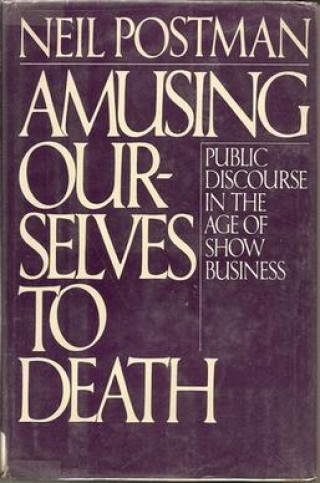In 1984, Americans took a look around at the world they had created for themselves and breathed a collective sigh of relief. The year George Orwell had appointed as the locus of his dark and only lightly fictionalized predictions—war, governmental manipulation, surveillance not just of actions, but of thoughts themselves—had brought with it, in reality, only the gentlest of dystopias. Sure, there was corporatism. Sure, there was communism. And yet, for most of the Americans living through that heady decade, 1984 had not, for all practical purposes, become Nineteen Eighty-Four. They surveyed themselves, and they congratulated themselves: They had escaped.
Or perhaps they hadn’t. Postman opened Amusing Ourselves to Death with a nod to the year that had preceded it. He talked about the freedoms enjoyed by the Americans of 1984—cultural, commercial, political. And then he broke the bad news: They’d been measuring themselves according to the wrong dystopia. It wasn’t Nineteen Eighty-Four that had the most to say about the America of the 1980s, but rather Aldous Huxley’s Brave New World. “In Huxley’s vision,” Postman noted, “no Big Brother is required to deprive people of their autonomy, maturity, and history.” Instead: “People will come to love their oppression, to adore the technologies that undo their capacities to think.”
The vehicle of their oppression, in this case? Yep, the television. Which had, Postman argued, thoroughly insinuated itself on all elements of American life—and not just in the boob-tubed, couch-potatoed, the-average-American-watches-five-hours-of-television-a-day kind of way that is so familiar in anti-TV invectives, but in a way that was decidedly more intimate. Postman was a media theorist above all, and Amusing Ourselves to Death owes debts, he acknowledges, to Marshall McLuhan and Walter Ong and Daniel Boorstin and Elizabeth Eisenstein and Karl Marx and Lewis Mumford and the general notion that we shape our tools, and thereafter our tools shape us. Mumford’s theories of clocks, Ong’s theories of speech, McLuhan’s theories of everything—there they all are, making an appearance in this argument about the civic threats of laughter. Postman would wind his warnings about the dystopian dangers of television around his own adaptation of McLuhan’s aphorism: The medium, he suggested, is not simply the message—it isn’t straightforward or self-aware enough for that. The medium, instead, is the metaphor.
